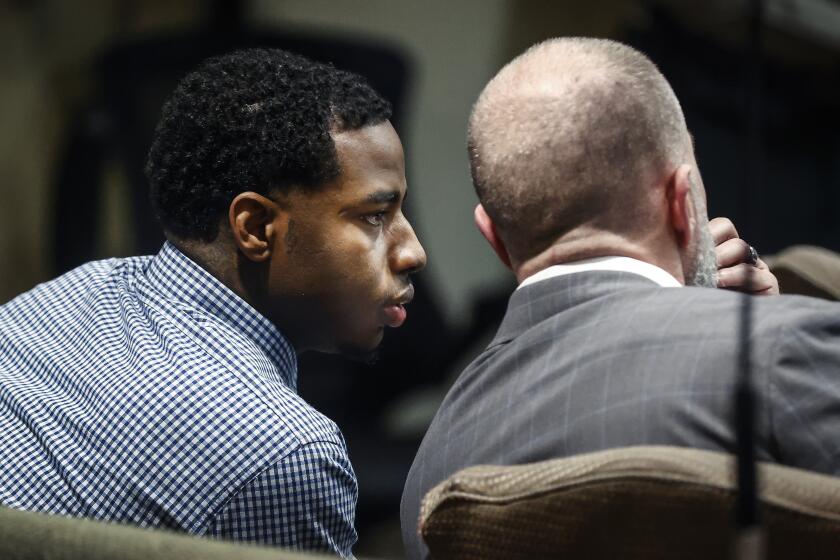The talk turns suggestive
FROLICKING in Chippendale-dancer-meets-drum-line-leader uniforms, Pretty Ricky is the latest face of urban teen pop. The Florida-based brother act, responsible for the smash ode to phone amour, “On the Hotline,” typifies hip-hop soul at its most libidinously boyish.
“On the Hotline” is a love song for the hookup generation, pushing innuendo toward soft-core porn. When Baby Blue, one of the group’s three rappers, murmurs, “Take them granny panties off, put a thong on,” he’s celebrating the journey of sexual explicitness from pop’s margins to its center, where Pretty Ricky role model R. Kelly still commands attention.
But wait. What’s that tune Pretty Ricky’s singer, Pleasure, picks up in the chorus? “Let’s talk about sex, baby, let’s talk about you and me.” Lifted from a 1991 classic by pioneering female rap trio Salt-N-Pepa, those lines hark back to an era when many hip-hop artists approached sexuality differently -- not less enthusiastically, but with a less mercenary consciousness.
“On the Hotline” isn’t the only new song to recall the era when safe sex was a cultural hot button, and mouthy fly girls had a chance against the stripper Madonnas who rule today.
“You,” sung by the lissome Atlanta crooner Lloyd (with a typically clever cameo by rapper Lil’ Wayne), is a seduction song with an old-fashioned twist: Young Lloyd uses the promise of fidelity to lure his lady in. Even more retro is the melody anchoring the song; it’s the hook from “True,” the 1980s chestnut by Spandau Ballet, re-imagined as a psychedelic reverie in PM Dawn’s 1991 hit “Set Adrift on Memory Bliss.”
PM Dawn was the Gnarls Barkley of its day, a duo that featured an oddball frontman and a sonically adventurous DJ. Brothers Prince Be and Minute Mix never fit anyone’s categories. In “You,” Lloyd’s and Lil’ Wayne’s verses are still earthbound compared with Prince Be’s dreamy contemplations of love and time, but the connection adds a velvet luster to what might have been just another make-out session.
Even newer than “You” is “Buddy,” the hot first single from Musiq Soulchild’s upcoming release “Luvanmusiq.” The neo-soul singer is making a bid for the mainstream with his fourth album, due March 13, and the rapid ascent of “Buddy” indicates that his odds are good. The song is anchored by a bumping bass line sampled from Taana Gardner’s 1981 disco fantasia “Heartbeat” -- and strongly invokes another song with the same sample and also titled “Buddy,” released by De La Soul in 1989.
That track appeared on De La Soul’s debut, “Three Feet High and Rising,” which gleefully pioneered so-called alternative hip-hop. An all-star jam (guests include Jungle Brothers, A Tribe Called Quest and, representing for the ladies, Monie Love), “Buddy” opens with a mission statement by producer Prince Paul -- “Buddy simply means body. Bodies of all kinds” -- and explores the language of sex from many playful angles. It’s like a game of spin the bottle with rhymes instead of kisses, one of pop’s most amiable ventures into the pleasure dome.
Musiq reworks “Buddy” with a more functional focus. He’s chatting up a girl in hopes that she’ll become his “friend with benefits,” to quote Alanis Morissette. If she’s “that one, down to have fun,” Musiq purrs, he’ll make their arrangement “equal, beneficial.” Romantic? Not quite, but there’s a clear-headedness about this affair that cleans the air of the testosterone stench of much of today’s booty-call hip-hop.
The mini-fad for referencing turn-of-the-’90s hip-hop may just be an accident; the samples Pretty Ricky, Lloyd and Musiq Soulchild employ have been mined by other artists, including Nelly and Ini Kamoze.
But by vocalizing these hooks instead of just interpolating them, the younger artists claim a legacy. Lloyd and the members of Pretty Ricky were barely in grade school when Salt-N-Pepa and PM Dawn were at their peak; Musiq probably admired De La Soul as a teen. This music echoes forth like a favorite children’s story, a hint of a more innocent, if not simpler, time.
Perhaps the pumped-up Lotharios of today want a break from all the bump and grind, and dream of eroticism as a realm that celebrates not just performance, but as Prince Paul said, bodies of all kinds.
More to Read
The biggest entertainment stories
Get our big stories about Hollywood, film, television, music, arts, culture and more right in your inbox as soon as they publish.
You may occasionally receive promotional content from the Los Angeles Times.










